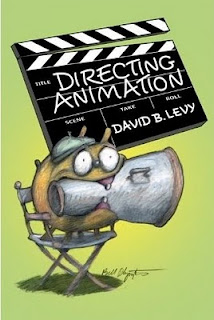 David Levy's books have consistent strengths. His tone is friendly and conversational. He is willing to admit mistakes he's made in his career, which gives him credibility. He interviews a wide selection of other animation professionals, so the books are not limited to Levy's own viewpoint.
David Levy's books have consistent strengths. His tone is friendly and conversational. He is willing to admit mistakes he's made in his career, which gives him credibility. He interviews a wide selection of other animation professionals, so the books are not limited to Levy's own viewpoint.His greatest strength is his concern for the people side of the animation business. Levy always focuses on behaving professionally, communicating clearly and being organized so as not to sabotage a project or one's own career.
All of these strengths are present in his latest book, Directing Animation. It includes chapters on directing indie films, commercials, TV series, features and for the web. Interview subjects include Bill Plympton, Tatiana Rosenthal, Nina Paley, Michael Sporn, PES, Xeth Feinberg, Tom Warburton, Yvette Kaplan and many others. Each of these people relate good and bad experiences they've had directing, giving a rounded view of the job and a host of things to avoid.
However, there is a hole at the center of this book in that Levy says very little about the actual craft of directing. The job of the director is to decide how the story will be told. Depending on the medium and the director, that might entail boarding, designing, cutting an animatic, directing voice talent, drawing character layouts, supervising layouts and backgrounds, timing animation, spotting music and sound effects, mixing sound and doing colour correction. Each of the above has the potential to enhance or detract from a film's effect on the audience, but you won't find any advice as to how these tasks can be used for greater or lesser results. The ultimate value of a director isn't people skills or organization, it's aesthetic. The viewers don't know (or care) if the crew got along or the production ran smoothly. Their only concern is what is on the screen.
Levy chooses not to make aesthetic distinctions. Even without getting specific about certain projects, there is still a wealth of material that could have been written about ways to communicate to an audience.
It is true that the role of the director in animation has been systematically devalued since the dawn of television. The huge amounts of footage that have to be produced for TV force directors to be little more than traffic cops, making sure that the work flows smoothly to the screen. Live action TV is dominated more by writers and producers than directors, and in animation, it's writers, designers and producers who rule the roost. Feature animation, with the exception of independent films, has mostly succumbed to the same disease. Where directors were once hired to realize their own vision, these days they're often executing another person's, lucky to insert a bit of themselves when no one is looking.
What's in this book is important and worth reading, as are Levy's other books. However, anyone interested in the craft of directing animation will find this book incomplete. The nuts and bolts of directing aren't here, let alone the distinction between what produces good and bad results.



